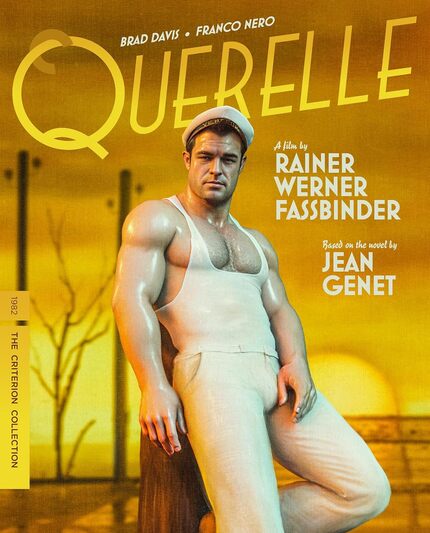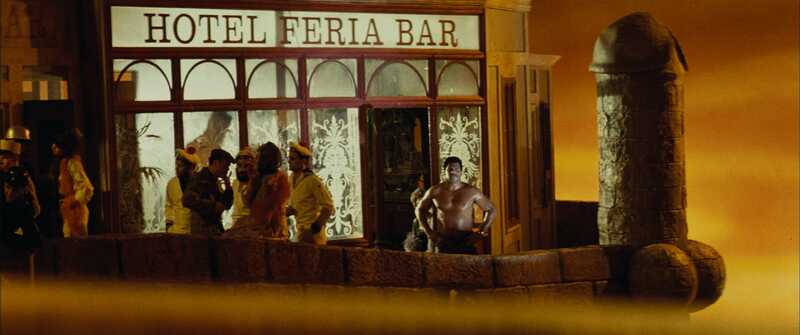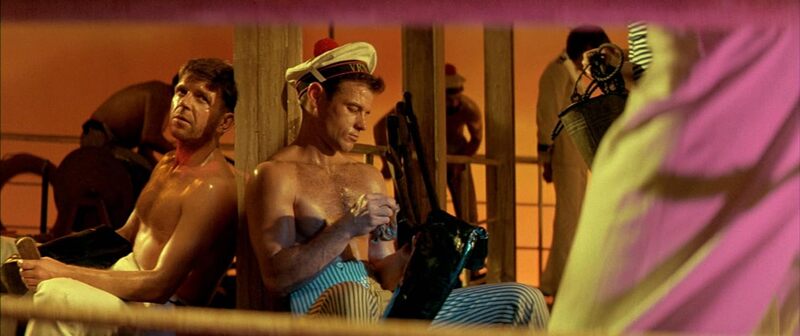QUERELLE Blu-ray Review: Docking with the Criterion Collection
Rainer Werner Fassbinder's final feature is visually inventive and darkly queer.

Confined to a stage-like world of translucent canvas walls, large artificial backdrops, and continuous golden-hour lighting, Querelle (1982) is as far from the rapturous mid-century Hollywood shore-leave outings (a la 1949's vibrant Stanley Donen/Gene Kelly location-driven musical On the Town) as a film could get.
What survives in this surprisingly stylized final film of Rainer Werner Fassbinder are the classic sailor outfits, their starched whites soaking up the buttery constant sunset of a nonexistent port in Brest, France. Here, the fire in the air is soaked up in pores of everyone. One gets the off-kilter sense that a place like this could be murder…
From the accurately and acutely striking cover art (the work of artist Astra Zero) on Criterion’s new Blu-ray release of this hellishly non-declarative work by New German Cinema’s morphing restless iconoclast Fassbinder, Querelle’s top-to-bottom artifice is apparent. Brest’s architecture outs the place as a gay man’s social haunt, it’s landscape of spire-ing cock turrets erecting a permanent “Tom of Finland” vibe.
From the decor of Lysiane (Jeanne Moreau) and her sexual predator husband Nono’s (Günther Kaufmann, a real-life squeeze of Fassbinder) busy brothel to the phallic trees dotting the place, cis male members are both implied and overt. Buildings have cutaway walls and are made of see-through flats, making Brest a particularly quasi-apocalyptic precursor of Greta Gerwig’s Barbie. Pass it along: there’s a meltdown in the Dream House.
The reach-around of such artifice extends to Belgian sailor Georges Querelle, the film’s terminally oblique main character. From the outset, it’s obvious that this beefy seaman, radiating so much hostility, is up to no good.
Quickly enough, this is confirmed. In the early minutes of his misadventures in Brest, during an opium exchange gone wrong, he manages to slash the throat of another man. The guy had the audacity to strip down to a jock strap in front of him.
Throughout, Querelle as portrayed by Brad Davis speaks in a deep affectless monotone (“I’m no fairy!”), his soulless demeanor pairing with his plastique, always bulging physique. He’s certainly caught the notice of his superior, Lieutenant Seblon (Franco Nero), whose eye for Querelle is perpetual.
Davis sells his character’s deadly imbalance with an icy, seething vacuousness. In his chest hair-baring wide-open white tank top, he proves to be a magnet for the many libidinous gay men of Brest. Sometimes, they win his company.
Adapted from French author Jean Genet's 1947 novel Querelle of Brest, Fassbinder’s film weilds an austere literary tone not unlike Kubrick’s Barry Lyndon (1975). While the film is in English, there are frequent text passages from the novel that appear on screen, always in their native French. These text interludes prove to be yet another way that Fassbinder sets Querelle apart from just about everything else. The director’s harshly sonambulistic tone is not violated by them, though whatever narrative flow might be churning is.
Elsewhere on the Criterion disc, critic Michael Koresky reiterates Fassbinder’s own claims that Querelle is not so much about gayness or murder as it is about a search for identity. Koresky goes on that this search, however, is very much “about the queer death drive.”
That much is obvious insofar as Jeanne Moreau’s madame character’s perpetual saloon warbling of “Each man kills the thing he loves… La-de-da, la-de-da….” It's not so much a song as an ominous refrain that won’t end and won’t let you out.
Criterion’s supplements here (spine number 1221) are few but fulfilling. The primary bonus feature is the 1982 documentary by Wolf Gremm Rainer Werner Fassbinder—Last Works. The one-hour film extensively utilizes behind- the-scenes footage to profile and contrast Fassbinder’s final acting role in Gremm’s own film, Kamikaze ‘89, and his final directorial effort, Querelle. Regarding the latter, Gremm narrates that, “Rainer said that Querelle isn’t about murder or homosexuality. It’s about the search for identity by all possible means at his disposal in our society.”
Gremm observes that while Fassbinder built elaborate surreal sets in a soundstage for Querelle, he opted for "finding it in the real world." There’s lots of interesting footage of Fassbinder and his fellow cast members dressed in loud, off-the-wall outfits as they engage in the story’s gunplay and car crashes. Unfortunately, the last 20 minutes of Last Works devolves into meandering footage on the set of Querelle. Actors mull about, lights are adjusted, the script girl marks up her script, etc. That’s the purgatorial enclosure of moviemaking.
In the brand-new featurette “Fassbinder in 5: Michael Koresky on an Authentic Revolution,” critic Michael Koresky covers how director Rainer Werner Fassbinder's aesthetics and visual storytelling greatly shifted several times. In only 23 minutes, Koresky uses clips from the span of Fassbinder’s shockingly extensive filmography to chart his visual evolution through five different phases. He also shows how Querelle, though fairly recognized as the likely intended start of a whole new aesthetic phase in the director’s career, was actually stylistically preceded by a latter episode of Fassbinder’s televised epic Berlin Alexanderplatz (1980).
Criterion’s treatment of Querelle on Blu-ray is anything but rough. The restored high-definition digital master in use has been approved by director of photography Xaver Schwarzenberger, pushing the golden glints and deep burning yellows to their limits. It is nothing but strange, beautiful images from beginning to end.
The Blu-ray’s uncompressed monaural soundtrack fleshes out Fassbinder’s intentionally disjointed erotically remote worldbuilding. Composer Peer Raven’s nondiegetic haunting music heard throughout the film sounds nothing short of striking.
Querelle, not so simply put, is an oneiric panoply of aggression, violence, assertiveness, and survival of the fittest- one where not even its creator survived its immediate realization. Though career finality was never Fassbinder’s intent with this one, its doozy of a last line (which won’t be uttered here) can’t help but stir questions of any fatalistic premonitions he might’ve been projecting.
A sexual beast of a thing, Querelle may not be a skin-fest, but it spares little in terms of thrusting and lusting. Meanwhile, the arena of queer cinema has tectonically shifted since this film dropped in 1982. Regarding that, critic Nathan Lee, in his inserted printed essay, has this penetrating observation: “Radically nonnormative in both form and content, it is a postmodern melodrama grounded by a sweaty, seething, meaty eroticism-a confrontational sexuality that remains bracing.
"In contrast to today's cinematic landscape, where queer representation is largely a matter of respectability politics and sex scenes are subject to prudish pushback, Querelle is a movie that fucks.”
Criterion's list of features:
• Restored high-definition digital master, approved by director of photography Xaver Schwarzenberger, with uncompressed monaural soundtrack
• New interview with critic Michael Koresky on director Rainer Werner Fassbinder's aesthetics and visual storytelling
• Rainer Werner Fassbinder—Last Works, a 1982 documentary by Wolf Gremm
• Trailer
• English subtitles for the deaf and hard of hearing
• PLUS: An essay by critic Nathan Lee New cover by Astra Zero









